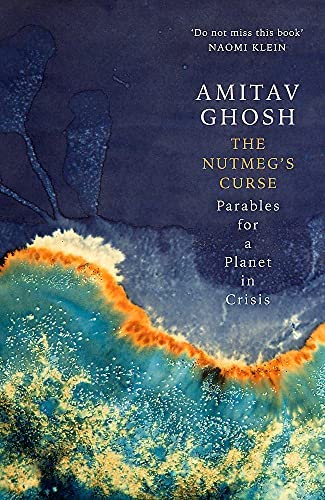In 1621, the Dutch East Indies Company virtually exterminated the native people of the Bandu Islands in order to seize a monopoly on the lucrative nutmeg trade. Amitav Ghosh uses this central story to imaginatively weave together disparate, seemingly unrelated threads to show how our colonial heritage has shaped the climate dilemma we now face.
There are countless Aha! moments in The Nutmeg’s Curse and many come from the most unlikely of places: from the witch hunts of the 16th and 17th centuries, to the North Dakota pipeline protests, to the immigrant crisis in Italy, and more.
In one example, Ghosh explores the vital role of fossil fuels in war-making. He notes that the US military is the single largest consumer of energy in the USA and probably the world. And that the military are far from denialists: their plans take accelerating climate change as a given. But, a transition in energy regimes will also entail a transition in geopolitical regimes.
So “it is a grave error to imagine that the world is not preparing for the disrupted planet of the future. It’s just that it’s not preparing by taking mitigatory measures or by reducing emissions: instead, it is preparing for a new geopolitical struggle for dominance.”
Another insightful example comes from Ghosh’s observation that a constant feature of appraisals of climate change is that they assume that the West will be largely insulated from its worst effects. However, he notes that “before 2020, the US and UK were at the very top of ‘countries best prepared to deal with the pandemic’. China was 51st. The actual outcomes were startingly at odds with those predictions… The paths taken by the pandemic suggest that the planetary crisis too will unfold in surprising and counterintuitive ways.”
The connecting theme in the book is the Bandu people’s struggles against a powerful colonial force. Ghosh shows how colonial thinking has dominated western culture ever since: a culture which prioritises a wholly materialistic view of the world, with benefits accruing to a small number of people in power, usually white men, with little regard for the earth, nature or ‘savage’ peoples. Those are merely ‘things’ that have to be shaped, changed or eradicated to achieve a desired outcome.
The power in Ghosh’s book comes not from a forceful statement of his thesis, but rather his unemotional, yet tantalising accounts of certain world events and an alternative interpretation of them. Ghosh’s writing gently pushes the reader to consider the implications of these events and when you make the connections with the climate change dilemma, the impact is revelatory.
I highly recommend this book to give you additional insights into climate change. Armed with those insights, it might inspire you to action, or to change your current actions to be even more effective.
The reviewer is a co-author of Court of the Grandchildren, a novel set in 2050s America.
